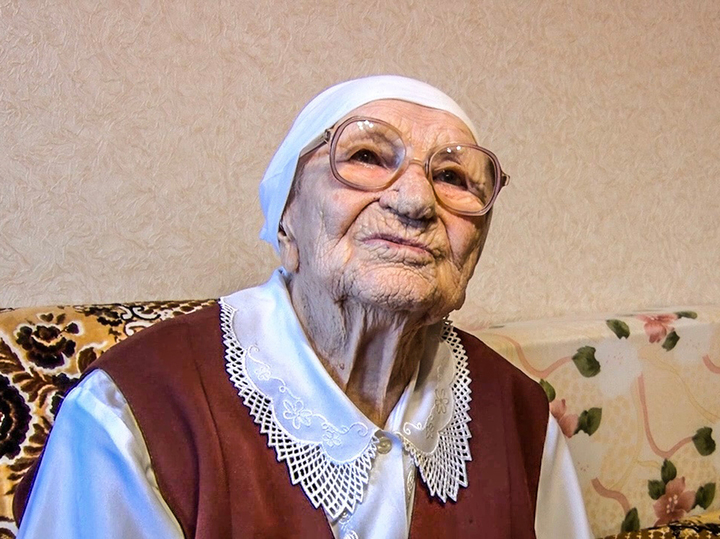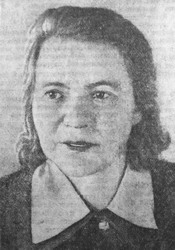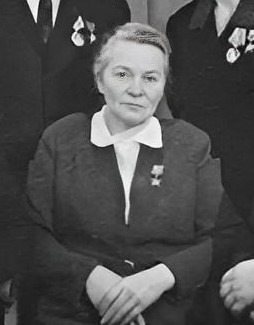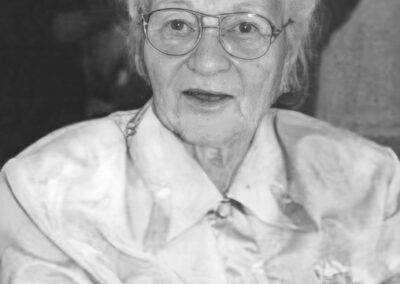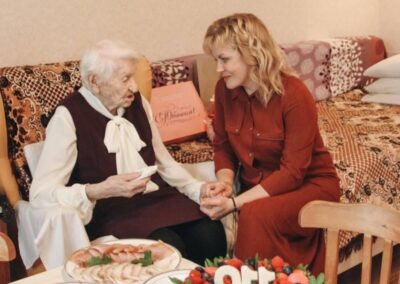Vera Nikolaevna Korolyova (Russian: Вера Николаевна Королёва) is a Russian supercentenarian.
BIOGRAPHY
Korolyova was born in the village of Timonino in the Klinsky District of Moscow Oblast, Russia (then Russian Empire), on 30 September 1914. Her family was large and relatively well-off. They owned three cows, a horse, harnesses, farming equipment, and a sturdy house. During the collectivization period, they were required to contribute one cow and some equipment to the collective farm. In 1932, she married and began working as a field laborer at “Timolray,” the first organized collective farm in the district. The farm’s name was formed from the initial letters of the villages that became part of it. She had two children, a son and a daughter.
During the early stages of the Great Patriotic War, as the front approached the Moscow region, she was mobilized to the labor front. Her task was to procure fuel for the city spinning and weaving factory in Vysokovsk. Reflecting on this period, she recounted that the Germans occupied the Vysokovsk region for three weeks (25 November–16 December 1941), causing widespread devastation. Alongside her mobilized companions, she worked to secure fuel for the factory, which had been 80% destroyed.
After the liberation of the Klin region, she resumed work on the collective farm and was appointed foreman of the field crew at the Kalinin collective farm, overseeing a team of 30 workers. The farm managed a small livestock operation, including a pigsty. At that time, all farming was done using horses and oxen, as there was no machinery available. With the establishment of machine and tractor stations, the collective farm gradually acquired tractors and other equipment. The sheaf thresher was even converted to run on electricity.
On 19 February 1948, by Decree of the Presidium of the Supreme Soviet, she was awarded the title of Hero of Socialist Labor. This recognition was for achieving high rye yields while meeting the collective farm’s mandatory deliveries, fulfilling in-kind payments for the work of the Machine and Tractor Station (MTS) in 1947, and ensuring grain seed supplies for the spring sowing of 1948. Along with this prestigious title, she also received the Order of Lenin. Until 1961, she worked on the Vysokovsky State Farm, which had been reorganized from a collective farm. After retiring in the same year, she became the chairperson of the Masyuginsky Village Council (renamed Shipulinsky in March 1995) in the Klinsky district. She also served as a deputy in the Moscow Regional Council of Workers’ Deputies in 1954 and received several medals for her contributions.
According to her granddaughter, even in her later years, she took pride in caring for herself, using creams and perfumes regularly. Her favorite television programs included news, political shows, and the Orthodox channel “Spas.” Her family recalled that she was always both a committed communist and a devout believer. Even during Soviet times, she openly expressed her respect for the church. When there was a plan to demolish the local church in Vysokovsk, she went to Moscow to petition against it—and successfully saved the church. She remained active in her garden and vegetable plot until the age of 101. However, a severe fall resulted in a hip fracture. Although her leg eventually healed, she struggled with mobility afterward, making it difficult for her to visit her summer house or even go outside. In later years, she also began experiencing vision problems, which forced her to give up her favorite hobby of knitting.
At the age of 110, she had four grandchildren, six great-grandchildren, and two great-great-grandchildren. On her 110th birthday, she received heartfelt congratulations from Alena Sokolskaya, the head of the city district, and Elena Khrustaleva, the chairperson of the Council of Deputies for the Klin city district. Sokolskaya joined her for a conversation over tea and presented her with a personalized cake adorned with the number “110” to mark the special occasion.
RECOGNITION
Her age has not been validated.
ATTRIBUTION
* Королёва, Вера Николаевна – Герои страны
* “Королёва Вера Николаевна (1914 г.р.), Герой Социалистического Труда.” – Библиотеки Клина, 2 December 2014
* “Жительница Высоковска Вера Королева отметила 101-ый день рождения” – БезФормата, 1 October 2015
* “Старейшая жительница Подмосковья готовится встретить 110-летний юбилей” – Московский комсомолец, 14 August 2024
* “Старейшая жительница Московской области отметила 110-летие” – Regions.ru, 30 September 2024
[crp limit=’4′ ]

